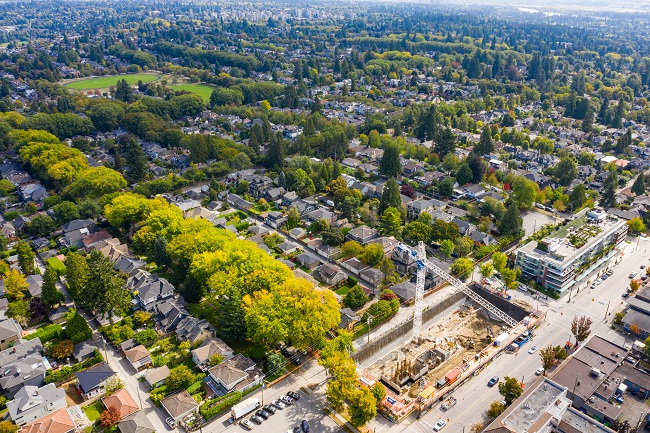Frequently Asked Questions

1) What is the Vancouver Plan?
The Vancouver Plan is a strategic plan that guides growth and change for the entire city to 2050 and beyond.
The Vancouver Plan features a city-wide land-use strategy and includes supporting policy directions, to guide growth in line with the key priorities the community has identified:
• Housing
• Transportation
• Employment and economy
• Climate change, environment sustainability
• Community amenities
• Infrastructure
• Other elements of sustainable communities
2) Why do we need a city-wide plan?
Vancouver is at the centre of a dynamic and prosperous region that is anticipated to grow by 1 million people and 500,000 jobs by 2050. Through four phases of public engagement, we heard clearly that people want a city that is inclusive, diverse and works for everyone, and that the status quo of City policies would not deliver the desired future.
Currently, the City uses various community plans, development plans, and other policy documents to guide growth and development. We need a single, unified city-wide plan to help guide our daily decisions and polices in the direction we desire. This is our opportunity to shape bold solutions and create a city where current and future generations can thrive.
3) How did you ensure everyone can take part in creating the plan?
To ensure the Vancouver Plan (and our future city) is shaped by the voices and diversity of our population, we gathered input from everyone who lives, works, or plays in Vancouver, with special attention to historically underrepresented groups, through four phases of public engagement.
In addition to community-wide engagement, a core focus of engagement included working with equity-denied communities such as youth, urban Indigenous peoples, people of colour, low-income seniors, single parent families, residents of SROs, those living in poverty, recent immigrants and others. This included the design and delivery of some customized activities, as well as ensuring additional supports were made available to lower barriers to participation at all events.
Key information about the Vancouver Plan, including engagement and planning materials, were translated into five languages that are commonly used in Vancouver (Simplified Chinese, Traditional Chinese, Punjabi, Tagalog, and Vietnamese). We also worked with organizations to provide language support where needed, including the use of interpreters and support for people with visual or audio impairments.
4) What was the Vancouver Plan Process?
Early in 2019, City Council directed staff to undertake a planning process to create an overarching city-wide plan to guide growth and change, and to create a more consistent and unifying strategy for the future.
The Vancouver Plan is the result of four phases of extensive public engagement, as well as two years of technical analysis on a wide range of planning topics such as land use, climate and transportation.
Over two and a half years and four phases, we engaged with Musqueam, Squamish, and Tsleil-Waututh Nations (the Nations), urban Indigenous Peoples, residents, senior governments and regional authorities, community groups, businesses, non-profits, civic advisory bodies and other stakeholders.
The Vancouver Plan engagement process reached more than 52,480 engagement touchpoints from November 14, 2019 to April 27, 2022. We received more than 25,000 survey responses from 12 online surveys that were available in at least six languages. We hosted hundreds of workshops, including 100 youth workshops, 29 neighbourhood workshops and more than 100 meetings with stakeholder organizations and community groups.
5) How will the plan be implemented?
Since being approved, the Vancouver Plan became the City’s strategic land-use framework, guiding more detailed plans and policy to come, as well as updating existing plans and policy to ensure these are aligned with Vancouver Plan.
As part of Vancouver Plan implementation, existing plans and policy will be reviewed for any gaps or areas of conflict with Vancouver Plan; some updates may be needed to ensure alignment moving forward.
For example, during the Vancouver Plan implementation phase a new 3-yr Housing Action Plan will be created that aligns with Vancouver Plan.
6) How was Vancouver Plan different from other City of Vancouver planning initiatives?
We recognize that there are multiple important city planning programs happening at any given time. The Vancouver Plan was developed in coordination with a number of programs that are currently underway or have just been completed, and will help unify and prioritize future directions for the city we want to become. These include the Broadway Plan, Jericho Lands Policy Statement, Equity Framework, Climate Emergency Response, and implementing the Housing Vancouver Strategy and existing community plans, as well as city-wide strategies and policy. City staff worked collaboratively to ensure that input received from all planning programs informed the Vancouver plan – and vice versa.
7) How will the Vancouver Plan integrate with regional planning initiatives?
This is an important time for long-term planning in our region and Vancouver Plan strategically aligns with a number of current regional planning initiatives, including Transport 2050 and the Metro Vancouver Regional Growth Strategy Update, Metro 2050. For example, the region’s draft long-range plans have informed the proposed “Rapid Transit Areas” that are found in the Vancouver Plan.
8) Who can I contact for more information?
- For general inquires, please contact: planningtogether@vancouver.ca or sign up to our email mailing list.
- For media inquires, please contact: media@vancouver.ca

